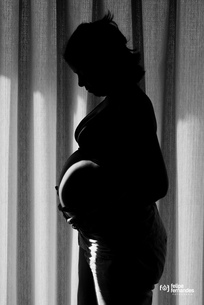|
The pain of sexual abuse is a topic many people don't often connect to childbirth, but there are profound implications for a woman that has endured this type of abuse. She may be approaching childbirth with great fear and trepidation because of something painful that took place in her past. She may be absolutely terrified of the pain she is likely to feel in the most private areas of her body and mind or she may have very real fears about being totally exposed in front of others that she barely knows. As I surveyed women, this topic came up as did the worry about having a doctor who would be "gruff," harsh, or insensitive with them. (I'm thankful I never had this at any of my births, but I have heard other stories from women who sadly did not have the same experience.)
Childbirth is a profoundly intimate time, which is one reason why I am always so honored to have the opportunity to serve women at their births. But in cases where a woman has endured sexual trauma, my role as doula is even more crucial. If you are reading this and you relate to this topic, I'm so deeply sorry. My heart aches for you and what you have gone through. Here are a few things that I hope and pray will help you as you prepare to deliver your baby. First, and I think most importantly, seek professional counseling, but only from someone that specializes in sexual abuse and trauma. Seek out recommendations. Make sure you check on insurance to know how much they will cover and how many sessions are included in the coverage. A good counselor will walk you through some dark rooms of your past that may have been locked for a long time, or perhaps you may have even thrown away the key a long time ago. He or she will take your hand, and together you will unlock the door, walk into the room and begin to bring those painful memories to light again. This will not be easy. It will take courage. But I promise you, healing will come if you do the hard work of unpacking your feelings and talking through the pain and fears that you may have kept pent up inside for a very long time. This is an important step in your journey (maybe the first one you've ever taken) toward healing that pain. The pain never will completely go away, and you will never forget, but healing is possible with the right help and support. Next, you may find that reading "When Survivors Give Birth" by Penny Simkin will be very helpful. There are other books like this, but this one truly helps women understand the triggers that pregnancy and childbirth can bring up in a survivor. Finally, consider the following factors when preparing for the birth:
If this post has resonated with you personally, it is my sincere hope that it has been helpful to you. I wish this topic didn't have a place in our world, but sadly, it does, and far too many people have been affected in this way. Please feel free to send me a private message via my facebook page (Happi Birth, Doula). I would love to continue the conversation with you. As always... Thanks for reading! ~Happi  In today's fifth post in my series on birth and fear, I am going to cover the next two common fears that women have in childbirth. The first is the fear that the baby could die during childbirth and the second is the concern that the baby might be born with genetic birth defects. The fears listed above were cited by several people that I polled about their fears in birth. Death of the baby is more common a fear than people like to talk about. I think every mom/couple has had these concerns roll around in the back of their minds at least once during pregnancy. It's a very real fear, especially to those who know someone personally that this has happened to or who have experienced it themselves. It's a terrifying reality for far too many, and my heart truly goes out to those whose lives this kind of loss has touched. Nothing can or will ever prepare a parent to endure this kind of loss. And no parent should ever have to walk such a difficult road. I am so thankful that there are organizations out there whose sole purpose is to work with bereaved parents. Some great ones that I have learned about are Now I Lay Me Down to Sleep and Share Pregnancy and Infancy Loss Support, Inc., Sufficient Grace Ministries, and a Facebook support group called Pregnancy After Loss. For those who find themselves plagued with fears about losing a baby, I would encourage you to talk to your healthcare provider about "counting kicks" as is described here. Sometimes, just counting the kicks of baby can provide an enormous amount of reassurance when those fears seem to be overwhelming. ***Please note: It is very important to remember that babies DO NOT move less in the final trimester. Many people believe the myth that as baby "runs out of space" they move less. This is not true. This is why counting kicks and being vigilant about staying aware of baby's most active periods of the day during pregnancy is very important. In addition to counting kicks, I have also known some expectant couples that purchased their own fetal monitors as a way to provide added reassurance so that they didn't have to wait for the doctor's appointment to hear baby's heartbeat (but not before 10 weeks as it is very hard to detect!). Again, this is something important to discuss with your provider. Just know this: It's okay to take those kinds of measures for you and your spouse/partner if you need to! You are not crazy and you are carrying precious cargo. It's perfectly normal to worry about the well-being of your baby! Concerns about birth defects are also very common among expectant moms and couples. For this discussion, I am referring mostly to those who chose not to have any genetic screening prior to the birth of the baby. Some parents opt out of the screening/testing because they would not choose to do anything differently if there were something abnormal. They would not terminate the pregnancy and would continue to carry the baby until the time came to deliver. Some people choose not to do any testing because they fear it's invasive and would rather not take the chance. In either case, the fear that something could be wrong with baby is a very real one. And the choice not to have testing done is very personal and should be respected by all providers. The only words of wisdom I can offer to help ease the fear of something being "wrong" with baby are these: The word "surrender" is extremely important when talking about issues relating to pregnancy and birth. It's a word I use with my clients in birth when transition comes or the pain seems to be too much to bear. I think the same parallels can be drawn here. As we surrender, we relinquish control. We give in to a greater Power than what we have within ourselves. And we trust that things will work out for the greater good of ourselves and those we love. Also, trust is the opposite of fear. My mom often says that much of what we fear never comes to pass, yet we can often spend endless energy worrying about things of which we have no control. And fear adds stress which isn't good for mom or baby. So if you have decided not to have the testing done, can I encourage you? Your baby is going to be born in perfect form and fashion according to how he or she has been made in the womb. As you carry your baby to completion, until the designated time has come for him or her to be born, trust that all is well until or unless there is reason to be concerned. I hope you've found these blog posts helpful. Please stay tuned for the next edition in this series on birth and fear, and as always... Thanks for reading! ~Happi  As I continue my series on birth and fear, it is my hope that these posts have been helpful to my readers. I have received some wonderful feedback, so thank you to those that are reading! Today I will address another one of the top 10 fears in childbirth: Interventions and complications. As I talk to pregnant women, I am very aware of the fact that there are different views of how women want to birth their babies. Statistics tell us that most birthing women choose to have an epidural and I want to be clear that I support women no matter how they choose to go about induction, pain relief, etc. Many women are completely fine with having interventions in their births and their outcome is still a joyful one. They aren't bothered in the same way that a woman desiring an intervention-free birth might be. I believe that birth choices are very personal and I hold no judgment toward those women who choose a medicated birth, desire to be induced for whatever reason, or even opt for an elective cesarean! To be clear, this post is not an advertisement for choosing intervention-free births, but rather a place for me to address this fear that I heard repeated often as I surveyed moms who are currently pregnant or who have recently had babies. This fear is common among first-time moms who are walking into the birth experience with a blank slate as well as seasoned moms who have had one or more intervention-free births or those who feel that their previous birth(s) was "less than ideal." For moms who sought to have as natural a birth as possible (meaning they desired to not have any medical interventions such as pitocin, an epidural, cesarean, etc.) but ended up with a birth that was filled with them, they may have ended up feeling less than satisfied with their birth experience, if not downright upset. In these cases, women need to be validated and heard. Having well-meaning people say things like, "Well, at least your baby is healthy....that's all that matters," is not always helpful. Birth choices are very personal, and these kind of comments can be hurtful to women who desired to have things go a certain way. They may feel like they failed, or that their body failed them. They may have significant feelings of loss. They may be at risk for postpartum depression or at the very least, have experienced a period of time that they had "baby blues." They may have had trouble bonding with their new baby and maybe even experienced resentment toward him/her. For these women, a repeat of this experience is a very real fear. For both groups, I want to offer what I hope will be helpful advice. First, I encourage you to have a birth plan. I have discussed that at length in a previous post in this series here. Make sure your support system and your care provider(s) know exactly what your wishes are. By being pro-active in this way, you are helping yourself and those around you know what you desire and what alternatives you prefer to pursue before you go the medical route. Second, educate yourself. Read, study, and ask questions of your providers and doula. Know the statistics of interventions, what causes them, and what you can do to prevent them as much as is in your control. Birth is extremely unpredictable, but there are quite a few things that we can control, so knowing what those things are and making sure your support system knows what they are is so incredibly helpful and important. Finally, if you haven't already done so, hire a doula. (I'll bet you didn't see that one coming, did you?) :) There is a great article here on the evidence of how having a doula resulted in more positive outcomes for women. Have a wonderful day! And as always... Thanks for reading! Happi  "Everyone Poops." That's the title of a book my sons always enjoyed reading when they were younger. It's also one of the greatest fears women have in childbirth. I often get asked the question, "What if I poop when I push?" Boys laugh at potty humor. In fact, in my house, that conversation is pretty commonplace. But women tend to be more...discreet. If you deliver in a hospital, you may already be anxious about the point at which all modesty goes out the window when you're on the table with bright lights and doctors, nurses, doulas, and the like in your private space. Add in the possibility of having a bowel movement during all of that flurry of activity and that may be enough to make you want to run for the hills and just not do this whole birth thing. Trust me when I say that one of the things that all professionals in the field of labor and delivery wish women knew was that poop is really not a big deal. It happens. It's as normal and natural to them as sneezing and nose blowing is to us when we have a cold. And doctors are super quick about getting rid of it as if it never happened. They get it. And they aren't freaked out by it. Let me put it this way: If you poop when you push, it means you are doing it absolutely RIGHT. In fact, doctors and nurses will often remind women of imagery associated with having a bowel movement to describe HOW to push effectively when the time comes. So please, dear reader. Do not fear poop. Everyone does it. At least once a day. :) Thanks for reading! Happi |
AuthorHappi loves serving families in the Northwest Suburbs of Chicago as a labor doula and childbirth educator. When she's not at a birth, she loves spending time at home with her loving husband and homeschooling her sons. She also finds great joy in serving the Lord at her church and teaching children about the love of Jesus! Archives
July 2024
Categories
All
|



 RSS Feed
RSS Feed